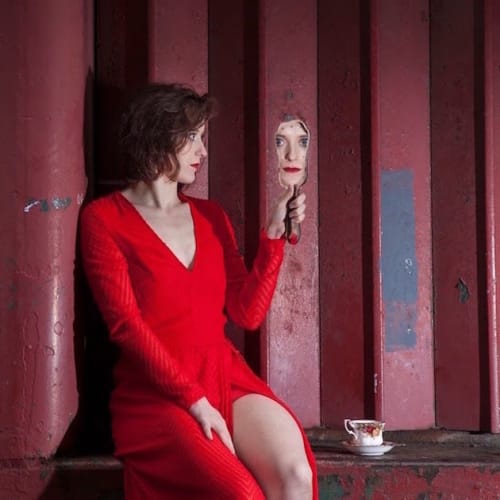We are in Madame’s boudoir. Madame herself, with the grandest of gestures and the haughtiest of airs, is commanding her adoring, self-abasing maid, Claire. Claire’s demeanour is that of a trepidatious, awe-stricken noviciate, serving the goddess. Madame shows such unfettered disdain, Claire is, at one point, literally downtrodden. Verbal abuse accompanies physical maltreatment—it is clear that neither party believes Claire, the maid, is fit to walk the same earth as her mistress.
If this opening to Genet’s classic, The Maids, seems too expansive, too “acted”, it’s meant to be. “Madame” here is being performed by her maid, Claire, whilst Claire herself is mimicked by her older sister, Solange (also maid to Madame). It becomes clear that we are witnessing a game these sinister mice like to play whenever the cat is away. Underpinning this repeated fantasy enactment that is central to the piece is the inescapable question: at what point will seductive, greedy fantasy gobble up reality?
While wondering, we wait for Madame to return. The telephone rings. It is Madame’s lover, Monsieur (pronounced ‘Monn-sure’ by the two servants). He has been released on bail. This could spell disaster for the sisters, as his arrest resulted from anonymous letters penned by Claire. A crisis approaches.
There is a reason the word ‘ecstasy’ has both a sacred and a profane application—if you’ve no idea what I’m on about, take a look at Bernini’s statue, The Ecstasy of St Teresa. This should be sufficient to provoke disquieting thoughts about the congress between the spiritual and the physical.
This production, ably directed by Michael White, embraces the friction between religion and eroticism. Catholic girls, Solange and Claire merge worship and self-loathing in almost equal measure. In their role play, they switch, each taking her turn as dominant mistress and submissive servant. “I’m nearly there,” says Solange, underlining the sexual element in their brutal fantasies, before signalling the end of a scene with the blunt announcement, “I’m there.”
At times, Solange (Katie Robinson) almost vibrates with repressed longing for and terror of some act of fulfilment (orgasm, murder, suicide, execution—freedom or oblivion?). “Think of what comes after,” she urges her sister, adding, “Nothing comes after.”
In amongst the gowns, the furs, the shoes, the hatboxes, the key props are a pair of household gloves—symbolising both the drudgery of the sisters’ lives and a possible deadly resolution. These are the gloves Solange will wear (so the fantasy goes) when, one night, she squeezes the life from Madame’s lovely throat.
When Madame comes home, her own flights of fantasy are mild by comparison. To rescue her imprisoned lover, she will follow him to Devil’s Island. Rejecting her life of luxurious indulgence, she gifts her maids the very clothes (gown and fur coat) they have coveted—though we do not believe the giving will be permanent. Madame's patronising sense of superiority, self-importance and entitlement are set against her own fantasies of self-sacrifice—for her beloved ‘Monsieur’. “It would bring me joy to bear his cross.”
Fearing her role in his arrest will be exposed, Claire hatches another plan. She will lace Madame’s tea with phenobarbital. In the grim farce that follows, Madame repeatedly declines to take refreshment.
Once Madame leaves to meet her lover, Claire instigates another game. In the role of Madame, she bullies her reluctant sister into serving her tea. As her little sister drinks the tea, Solange launches into a brilliantly vitriolic closing monologue. Genet leaves us with the unanswered question: is Solange now complicit in Claire’s suicide, or is this merely a new twist in the game? Fantasy or reality; we are convinced it will not end happily.
Olivia Sweeney (Claire) and Katie Robinson (Solange) bring a searing intensity to the sisters whose affection for one another has been perverted by circumstance. “When slaves love one another, it isn’t love.” If anything, Robinson’s Solange out-weirds even Sweeney’s Claire—quite an accomplishment (and yes, that is a compliment to both).
Deborah Pugh’s Madame, persuasively self-obsessed and imperious, contains a necessary element of restraint. This Madame is not especially monstrous; she is neither better nor worse than the social set she represents. Though she believes in her own importance, we also feel she might see herself as sensitive, generous and even loving.
Genet has created a witch’s cauldron of overwhelming and conflicting emotion: adoration, hatred, love, self-loathing, rage, fear, envy, desire, repulsion. The challenge for any production is to find a rhythm for it, so that the climax does not feel like more of the same—however wonderful that same might have been. This Square Peg production doesn’t quite solve that problem (it may, when all is said and done, be beyond solution). Nevertheless, it is a very fine production.
The Maids is a piece of such unrelenting ferocity that audiences can find it stamina-sapping and be tempted to withdraw from engagement somewhere along the way. Please don’t do that. Sit up straight. Pay attention. It’s spellbinding.
